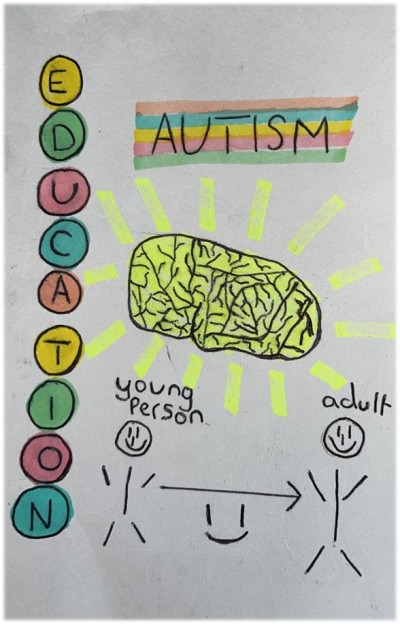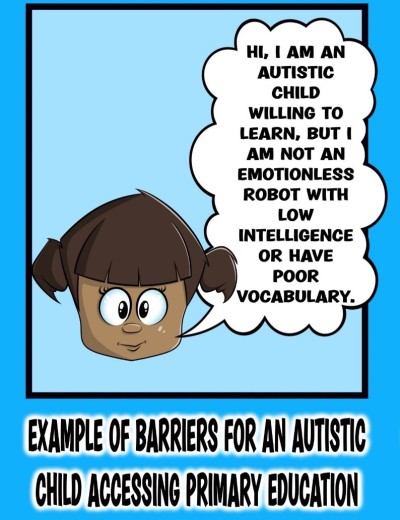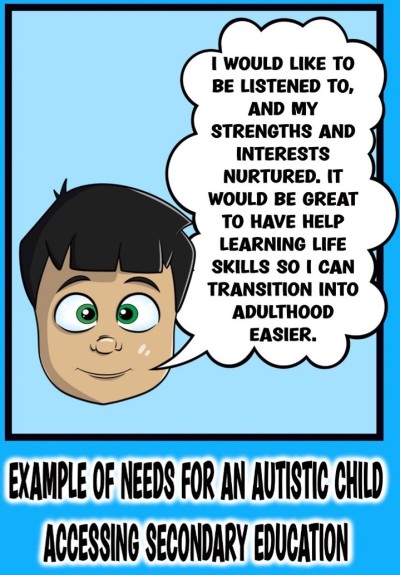Use the 'next' button to view the Autism Strategy page by page.
Aim two of our autism strategy is 'Improving autistic children and young people’s access to education, and supporting positive transitions into adulthood.'

In this section we have included examples by Autistic Minds to help illustrate the barriers autistic children face when accessing primary education, and the needs of autistic children accessing secondary education.
Later in this section we discuss:
- Themes, feedback and suggestions raised by people during our review
- Our commitments to deliver this aim
- How we will work towards our aim within CWP between 2022-2027
- How we will work towards our aim with partners between 2022-2027
Artwork by Cheshire East Jigsaw Group
|
Improving understanding and acceptance of autism within society |
|
|
Examples of unacceptable things to say to an autistic person:  "Hi, I am an autistic child willing to learn, but I am not an emotionless robot with low intelligence or have poor vocabulary." |
Examples of acceptable and helpful things to say to an autistic person:  "I would like to be listened to, and my strengths and interests nurtured. It would be a great to have help learning life skills so I can transition into adulthood easier." |
| Dottie attends mainstream primary school. She struggles to communicate and take information on board in a classroom so becomes anxious. Dottie excels when she is able to take in bite-size amounts of information with one-to-one teaching. | Chia-Hao has found secondary school difficult. It's a big, busy, ever changing environment which has caused him anxiety. His parents spoke to his teachers about all the available options. They agreed a plan of reasonable adjustments would be best including one to one support and access to a quiet space. Chia-Hao is please that with his friends learning together. |
|
Themes, feedback and suggestions raised by people during our review: |
|
Workforce development Culture: attitude and awareness
Quality of service provision and delivery
Working with partners and stakeholders Access to support in the community
Services talking to each other Need to ensure communication across and between services |
|
Our commitments to deliver this aim |
|
Workforce development Our Mental Health in Schools Service will support teachers and educational staff to understand the specific needs of their autistic pupils, ensuring that more school placements can be sustained. Quality of Service Provision and Delivery Working with commissioners, we will increase access to autism diagnosis for children and young people, identifying their needs at an earlier stage. Working with partners and stakeholders Working with our partners in education and social care, we will improve the pathway for young people as they move through education into adult life (transition). |
How we will work towards our aim within CWP between 2022-2027:
Workforce development
- We will identify the level of training required for our Mental Health in Schools Team to build capability in delivering autism informed services. We will address any skills gaps in this Team
- We will review the skill mix and staff training to effectively implement a standardised assessment
- We will provide training for all mainstream
0-18 Child and Adolescent Mental Health Services (CAMHS ) staff in the following:
- Interventions /care based on the principles of Positive Behaviour Support and Trauma-informed support, showing how to adapt these to meet the needs of the individual
- Understanding the Equalities Act 2010
- recognising mental health risks and presentation in the neuro-diverse population
- Reasonable adjustments in access, assessment, and intervention for the neuro-diverse population, including mild to moderate intellectual disabilities
Adapting therapies for autistic people and those with intellectual disabilities
Quality of Service Provision and Delivery
- We will review children’s autism diagnostic and post-diagnostic services – reducing variation in practice and standardising assessment procedures, including intellectual disabilities, and outline the training and skills mix needed to deliver these
- We will link the evaluation of care pathways used by autistic children and young people into our CAMHS research and audit strategy
- We will clearly articulate the mental health offer for Children and Young People (CYP) with autism, neurodevelopmental disorders, and intellectual disabilities.
- We will improve the pathway as young people move between services (such as between the mental health and youth justice interface) as well as when they move into adult services (often referred to as transition) by making this seamless to avoid autistic people falling into gaps between services, having clear signposting to adult services and implementing National Institute of Clinical Effectiveness quality recommendations.
- For young people with the most complex needs, we will create a specialist advice and consultation team who will support health, education, and care services – with an aim to reduce mental health crisis and avoid hospital admission.
How we will work towards our aim with partners between 2022-2027:
We will continue to work with commissioners to identify the gaps in current services and increase the level of investment into autistic services for children and young people with an aim to increase access to diagnosis and post-diagnostic support.
Working with partners in paediatric services, we will aim to streamline the pathways between acute and mental health services for children and young people.
Our Mental Health in Schools Team will work in schools to support teachers and educational staff to be able to identify and support lower level emotional and wellbeing mental health needs and recognise and support autistic traits.
We will develop the skills and knowledge amongst children, young people and parents/carers who access services using easy-read, person-centred care plans and using approaches based on the principle of positive behaviour support
We will ensure that on-line training modules for families will include modules on communication, sensory needs, understanding physical health needs, understanding mental health needs and presentations.
We will develop the skills and knowledge amongst partners/organisations/agencies who provide services for CYP and parents/carers using easy-read, person-centred care plans and using approaches based on the principle of positive behaviour support.